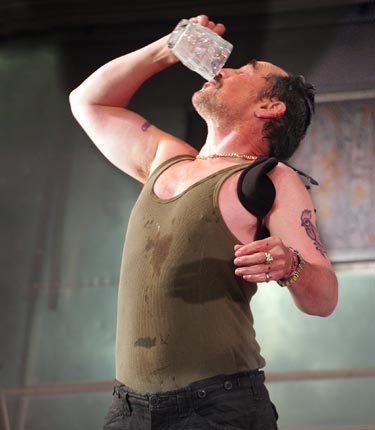Jerusalem, Apollo Theatre, London

Your support helps us to tell the story
From reproductive rights to climate change to Big Tech, The Independent is on the ground when the story is developing. Whether it's investigating the financials of Elon Musk's pro-Trump PAC or producing our latest documentary, 'The A Word', which shines a light on the American women fighting for reproductive rights, we know how important it is to parse out the facts from the messaging.
At such a critical moment in US history, we need reporters on the ground. Your donation allows us to keep sending journalists to speak to both sides of the story.
The Independent is trusted by Americans across the entire political spectrum. And unlike many other quality news outlets, we choose not to lock Americans out of our reporting and analysis with paywalls. We believe quality journalism should be available to everyone, paid for by those who can afford it.
Your support makes all the difference.Last year, illness kept me out of the theatre for nine months. Human beings are stubbornly stoical creatures and it was surprising just how bearable I found being absent from some of the hits of the hour. But the one thing it's fair to say that I pined to see has just obliged me by transferring to the West End and it's been worth the wait. Jez Butterworth's Jerusalem, beautifully directed by Ian Rickson and starring the incomparable Mark Rylance, proves to be, if anything, even better than its award-laden, ecstatic publicity suggests.
Rylance plays Johnny "Rooster" Byron, the frowsty, vodka-swilling ex-stuntman; the chaotically unholy mix of Falstaff and Pistol; the drug-dispensing misleader of youth who makes Socrates and the Pied Piper look like Maria von Trapp; the limping hangover-waiting-to-happen; and the one-man caravan-dwelling challenge to everything in our current nannying, amnesiac culture that wants to pave over the past and chain us in our nappies to focus-group-fostered conformities.
Set on the annual St George's Day Flintlock Fair, Butterworth's play is liberatingly funny and doubly subversive because it constitutes both a celebration of the ancient rituals of this green and pleasant land and a droll acknowledgement that many supposedly immemorial traditions were invented by authority relatively recently in an effort to put one past the people.
Facing eviction from his gypsy redoubt by South Wiltshire Constabulary, Johnny may be an inveterate fantasist and an incorrigible self-mythologiser but he knows how to call the bluff on crappy cant. Wesley, the publican, has been forced by the brewery ("a Swindon-level decision") into Morris-dancer clobber so that, as the "Barley sword-bearer" he can enact an alcoholic-cake-cutting ritual that "connotes fertility and the hunt". Johnny takes one look at a cack-footed excerpt and lobs this little hand-grenade at it: "I'm no expert, but to me it says 'I have completely lost my self-respect'".
Rylance creates the illusion that he has physically reinvented himself to play this tough-bodied broken-boned figure. But he's so in tune with the spirit of the role that it is as if he has co-created the character with Butterworth. Our greatest living actor may never have misled male minors or seduced underage girls; but he once led a tour of The Tempest to ancient sites built on England's ley-lines and he brilliantly resurrected the ethos of Shakespeare's Globe (which would have been an intriguing venue for Jerusalem), and he's never been unwilling to disturb the smooth hypocrisies of an awards ceremony with pointed political protest.
Rickson's cast are uniformly superb in all their cranky idiosyncracies. But Rylance is, like Johnny, in a league of his own. Aptly for a play about the layers of tradition, his performance seems to strike retrospective probes through his career to date – right down to another seditious outlaw who headed a gang of misfits: Peter Pan. You even get a smack of a cracked version of Henry V, the role with which he officially inaugurated the Globe, when our drug-fuelled hero imagines his band of brothers taking on the local council.
It's a wonderfully funny feat, shadowed by darkness. Just watch the mixture of oblivious child-like wonder and adult denial with which he stares at the mobile phone playing footage of him drunkenly smashing his own TV with a cricket bat. As he recounts his tall tales of meeting giants, he's brilliantly elusive – part transparent con and part infectiously convinced by his own, often bathetically chatty legend. And unlike Falstaff, Johnny is not at bottom a coward. Alone as he always knew he'd be, Rylance makes you root fiercely for this unorthodox, instantly iconic hero as he pounds the drum and invokes at the end. The other noise you hear is the sound of the audience's hearts beating in fervent response.
To 24 April (0844 412 4658)
Join our commenting forum
Join thought-provoking conversations, follow other Independent readers and see their replies
Comments